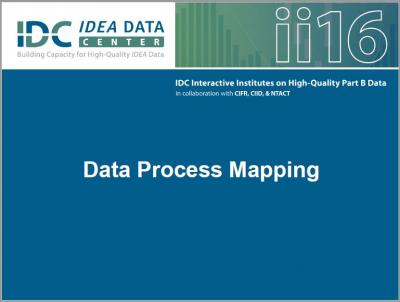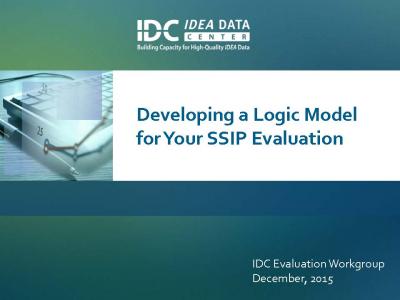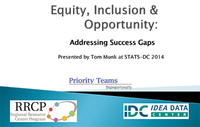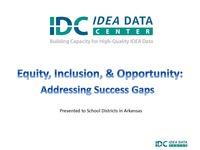Site Search
Results 15 - 21 of 57
Format: Presentations
Data Process MappingDo you ever wonder what other states are doing to ensure high-quality data? Participants of this session learned about the work that the Kentucky Department of Education is undertaking to create data process protocols, build capacity of data stewards, and institute a culture of high-quality data. This work is being accomplished using the new IDC Data Processes Toolkit. Presenters provided an overview of the toolkit, and participants had an opportunity to experience “preparing for this work.”
Format: Presentations
Developing a Logic Model for Your SSIP EvaluationThis presentation focuses on the role that developing a logic model has in overall SSIP evaluation planning.
Format: Presentations
Developing Data LiteracyData literacy is a critical component of achieving and maintaining a culture of high-quality data and use. Working toward a high level of data literacy within an agency is an ongoing process that involves many steps and players. This session presented key considerations for improving data literacy, including how to develop and apply data to inform policy and practice and ensure that an agencies shares a meaningful story of the data with stakeholders that all can understand and use.
Format: Presentations
Digging Into the IDEA Data Quality Reports to Improve Data QualityOSEP has provided states with data quality reports, now what? This workshop explored ways states can use the IDEA Data Quality Review and Year to Year reports to improve data quality. Participants engaged in hands-on exercises to explore how the OSEP-provided reports may point to systemic issues related to internal state processes or communication. Participants explored next steps after identifying data quality issues, including applying best practices for writing data notes, incorporating lessons learned into internal processes or systems, and exploring opportunities for support or training for LEAs.
Format: Presentations
Equity, Inclusion and Opportunity: Addressing Success GapsThe presentation introduces a research-based guidance document and self-assessment rubric designed to help districts and schools identify the root causes of "success gaps" (for example, in test scores, suspension or graduation rates, or course credits) for some groups of students, thereby helping schools to improve and equalize results for all students.
Format: Presentations
Equity, Inclusion, & Opportunity: Addressing Success GapsThis presentation introduced the audience of local education agency personnel to new tools, the Equity, Inclusion, and Opportunity: How to Address Success Gaps Rubric and the Equity, Inclusion and Opportunity: How to Address Success Gaps White Paper. The rubric and white paper were developed by a group of OSEP-funded technical assistance providers, with input from states and other experts. The Equity, Inclusion, and Opportunity: How to Address Success Gaps tools provide a process for reducing the differences in school success among subgroups of students by providing a structure for districts or schools to examine their current practices and identify areas for improvement.
Format: Presentations
Equity, Inclusion, and Opportunity in Special EducationIn this webinar, which IDC staff presented for the University of Tennessee’s Boling Center for Developmental Disabilities, we first discuss the requirements in the IDEA related to disproportionality, describe methods for calculating disproportionality, and present data, both at the national level and for the state of Tennessee. The second part of the webinar introduces a research-based guidance document and self-assessment rubric designed to help schools and districts identify the root causes of "success gaps."








